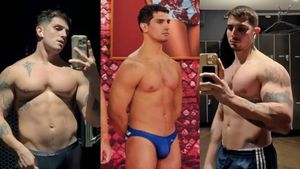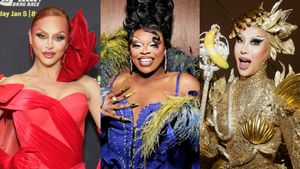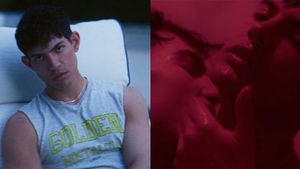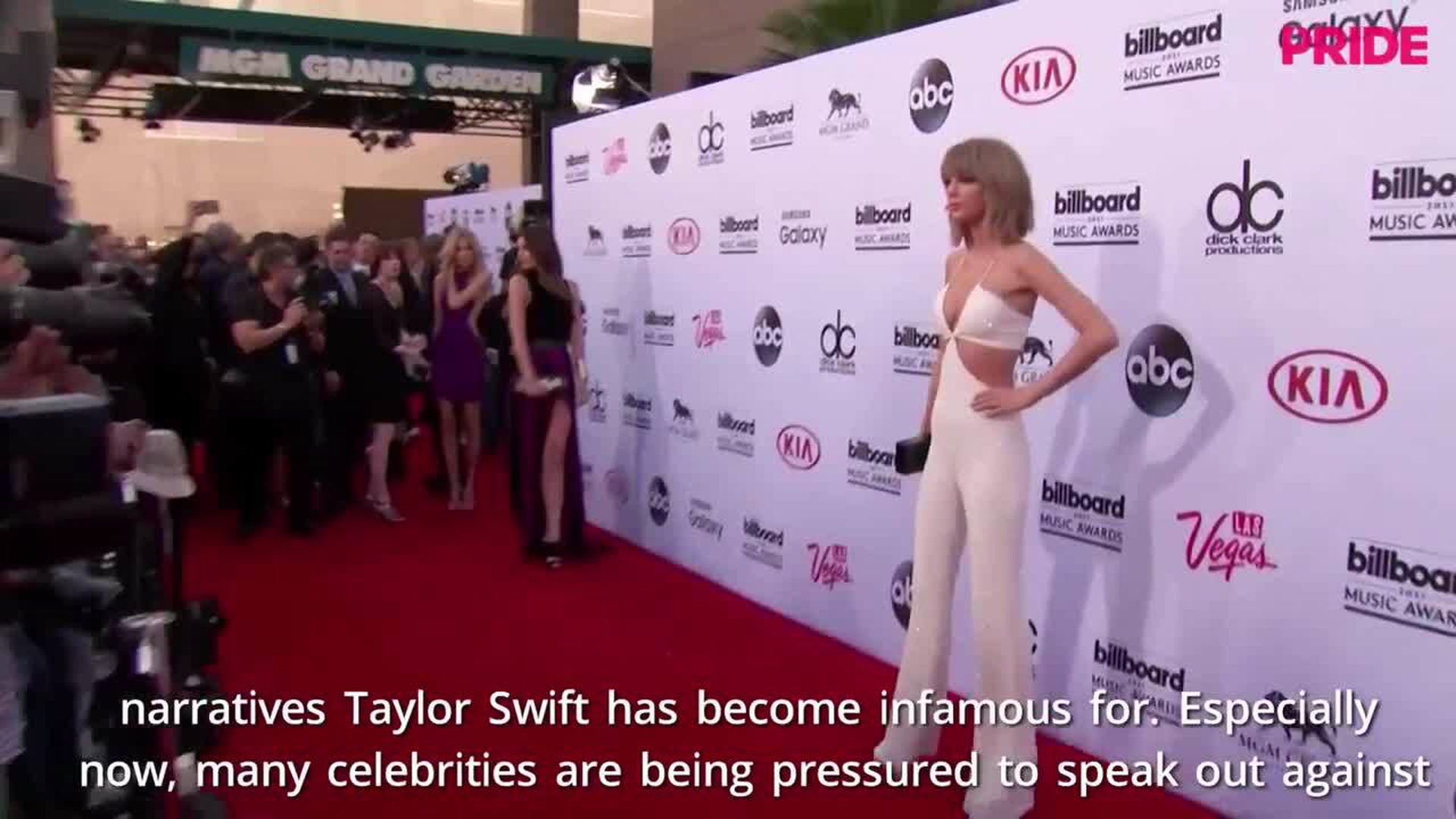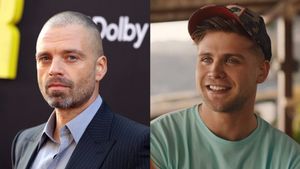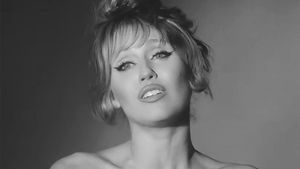In her latest triumphant attempt to break out of her musical comfort zone, Taylor Swift dropped her comeback single "Look What You Made Me Do" last week and effectively set the internet ablaze.
With the gusto of an angsty femme fatale who was wronged unjustly, Swift’s empowerment anthem spins a crafted web of vindication, liberation, and independence. One to always have her finger on the pulse of public perception, Swift never shies away from translating her real life into powerhouse hits—and "Look What You Made Do" is no exception. The single has already gone on to breaks records; it only took the song 30 minutes to reach the #1 spot on iTunes, it got the most first-day streams of all time on Spotify, and the track’s music video smashed the record for most views in 24 hours (previously held by Adele's "Hello"). However, as Taylor Swift knows all too well, mad love comes with a lot of bad blood.
As one of the most polarizing figures in music today, Swift has become the punching bag of the music industry, with far more wear than any other female artist out there today. And while many take to Twitter, blogs, and even right here at PRIDE to voice their negative opinions on the songstress, I’m here to respectfully say they’re unwarranted, undeserving, and unjustified.
Unwarranted: Criticizing her for material that is based on her life.
Writing what you know is no foreign formula. Translating personal experiences into songwriting is nothing new. Songs that comment, challenge, and combat the usual conventions of fame are some of the most iconic. So why does a song like Britney’s "Piece of Me" or Gaga’s "Paparazzi"get past public scrutiny, but "Look What You Made Me Do" cannot?
It’s a strange world we live in where a female artist gets publicly shamed for writing a song about an experience she herself felt strongly about one way or another. Who are we to belittle her feelings or undercut her sentiments based on our personal opinions of her. If you think she plays the victim, if you think her material is unrelatable, if you think she’s out of touch as an artist, simply don’t listen. However, I challenge you to take these same hard-pressed set of standards and apply them to every artist/song you listen to. It is sure to reveal that you’re holding other musicians to a completely different standard than Taylor herself. "No Frauds" by Nicki Minaj? "Bam" by Jay-Z? "Obsessed" by Mariah Carey? "Rumors"by Lindsay Lohan?
Undeserving: Assuming that because Taylor Swift is a pop star, she’s also a social activist.
What is the responsibly of a celebrity and what is the finite job requirements when taking this position? Taylor Swift is a pop star, not a political advocate for social injustices. However, there’s no denying that celebrities, especially in 2017, have had more pressure on them to speak out against the wrong-doings in our country, of which Taylor has been quiet...on some. She’s publicly tweeted support for the Women’s March, marriage equality, #FreeKesha, and sexual abuse victims, and she was met with backlash every time she did so.
Teen Vogue's De Elizabeth did a deep dive into this phenomenon:
"From Taylor’s perspective, it could easily be seen as a case of "damned if I do, damned if I don’t." She was criticized when she raised her voice online, and she was criticized when she didn’t. Put yourself in her shoes."
They went on to say,"“All of this speaks to a turning point in the way we look to celebrities for guidance… [but] at what point do these expectations become unfair? While it might make sense that Taylor’s fans would expect her to get up and march for women’s rights, there has to be a line between sincerely hoping that she does and getting angry when she doesn’t."
As a Taylor Swift fan, OF COURSE I would love for her to yell from the rooftops, "I voted for Hillary, hear me roar!" but that’s not what I signed up for. I signed up for pop music, lyrics that speak to my soul, and a kick-ass concert every couple of years. We’re owed that. What she’s not owed is presumptuous and accusatory backlash for something she had no obligation to fulfill in the first place.
Unjustified: Creating false narratives that Taylor herself actually doesn’t want to be a part of.
Playing the victim, entitlement, whiteness, false feminism, Beyoncé vs. Taylor are all very striking narratives Taylor Swift has become infamous for. There are now so many rumors, labels, accusations, and so much mud-slinging and shade-throwing when it comes to Taylor that it’s hard to dispute every time it happens, however, I think this latest example paints a very clear picture.
Last week, Taylor revealed a quick look into her new music video for "Look What You Made Me Do" and the Internet was quick to point out that a scene seemed to slightly resemble Beyoncé’s video for "Formation."
From this one out of context, one-second screenshot conclusions were drawn, names were called, and serious accusations flew. Todrick Hall, Taylor’s close friend and co-star in the music video was even dragged into the mix. He was slammed for perpetuating white feminism and was called a disappointment and desperate for white approval. All of this from a video no one had even seen yet. Another lose-lose battle for Taylor: highlighting "people that don’t look like her" (as Kyle Krieger asked above) or perpetuate white gentrification by doing so.
Mind you, once the video was released, not only did it have nothing to do with Beyoncé or whiteness, it was an introspective parody of Taylor herself (portrayed as a zombie for most of the video), showing that she herself was sick of the stereotypes and labels.
While my fellow co-writer here at PRIDE (ironically, also named Taylor) claimed that Swift’s upcoming album Reputation "seems to comment on the media’s unfair coverage of her," followed by a direct comparison to Donald Trump, I think differently. It’s so much smarter than that. It has nothing to do with media or fake news. And I think RuPaul's Drag Race alum Adore Delano actually said it best:
Taylor is giving back exactly what we’ve been giving her. She’s absorbing everything that’s happening in the zeitgeist and beautifully vomiting it back at us as a giant pop music slap in the face.
Obviously, opinions are extremely warranted especially for someone at the epi-center of pop-culture and just by writing this article I’m probably re-enforcing the "Taylor Swift is a victim" narrative, but regardless of the medium, let’s appreciate artists for the artists they are and remember that the hate you’re perpetuating is never worth the platform it stands on.
Mad love, not bad blood.
















































